Cyber Law Reform from the Perspective of Pancasila: Between Legal Certainty and Social Justice
Reformasi Hukum Siber dari Perspektif Pancasila: antara Kepastian Hukum dan Keadilan Sosial
DOI:
https://doi.org/10.32734/nlrjolci.v4i2.20797Keywords:
Legal Reform, Cyber Law, Social JusticeAbstract
This article explores the reform of cyber law in Indonesia from the perspective of Pancasila, emphasizing the tension between legal certainty and social justice. As information technology evolves rapidly, legal challenges in the digital space become increasingly complex, demanding a legal system that is both adaptive and grounded in national foundational values. In this context, Pancasila serves as a normative paradigm guiding legal reform, ensuring that it does not solely prioritize legal certainty but also guarantees the fair protection of citizens' rights. The article analyses various policies and regulations concerning cyber law and examines the extent to which Pancasila principles are reflected in the legislative and implementation processes. Using a normative and conceptual approach, this study aims to contribute to the development of a cyber law framework that is not only responsive to technological change but also embodies social justice for all Indonesians
Downloads
References
Advitama, D., Wibowo, B. R., Christiawan, R., & Widjaja, G. (2025). Criminal Law and Freedom of Opinion in the Era of Digital Democracy (Case Study in Indonesia). Eduvest - Journal of Universal Studies, 5(5), 5108–5120. https://doi.org/10.59188/eduvest.v5i5.51145
Afisa, Qodir, Z., Habibullah, A., & Sugiharto, U. (2024). Analysis of the ITE Law on Digital Rights and Democratic Values in Indonesia. The Journal of Society and Media, 8(2), 424–444. https://doi.org/10.26740/jsm.v8n2.p424-444
Al-Ulamai, U. A., Harahap, R. D. K. A., & Maskur, A. (2025). Tantangan Penegakan Hukum Terhadap Kejahatan Siber Pada Era Digital di Jawa Tengah. Jurnal Serambi Hukum, 18(2), 249–257.
Arafat, Z., Asyhadi, F., Amaliya, L., & Dewi, S. (2025). The Existence of Legal Philosophy in the Transformation of the Indonesian Legal System in the Era of Digitalization. MSJ: Majority Science Journal, 3(2), 180–187. https://doi.org/10.61942/msj.v3i2.319
Desinta, D. D. R. (2024). Pancasila di Era Masyarakat Digital 5.0: Perpspektif Sistem Hukum Indonesia. International Journal of Law and Economics Review, 19(1). https://doi.org/10.21070/ijler.v19i1.996
Feka, M., Pujiyono, P., Sularto, R. B., & Pareke, J. T. (2025). Navigating the Legal Minefield: The Impact of Articles 27A and 27B of Indonesia’s EIT Law on Freedom of Expression and the Path to Legal Reform. Journal of Law and Legal Reform, 6(1), 265–304. https://doi.org/10.15294/jllr.v6i1.19116
Fitri, S. N. (2022). Politik Hukum Pembentukan Cyber Law Undang-undang Informasi dan Transaksi Elektronik di Indonesia. Jurnal Ilmu Hukum, Perundangan-undangan, dan Pranata Sosial, 7(1), 104–124. https://doi.org/10.22373/justisia.v7i1.12719
Gustryan, M., & Sulaiman, A. (2025). The Urgency of Regulatory Reformulation and Strengthening the Capacity of Law Enforcers in Combating Cybercrime Through a Criminal Law Approach in Indonesia. Greenation International Journal of Law and Social Sciences, 3(2), 221–229. https://doi.org/10.38035/gijlss.v3i2.416
H. S., S., & Nurbani, E. S. (2014). Penerapan Teori Hukum pada Penelitian Tesis dan Disertasi. Rajawali Pers.
Harahap, A. M., Dewi, A. T., & Saragi, S. (2023). Urgensi Pancasila dalam Penbaharuan Hukum pada Era Digitalisasi di Indonesia. Warta Dharmawangsa, 7(1), 126–133. https://doi.org/10.46576/wdw.v17i1.2926
Kurniawan, I. D., Widiatmaka, P., & Robby, S. B. (2023). Keterlibatan Masyarakat dalam Pembentukan Undang-undang sebagai Implementasi Demokrasi. Jurnal Analisis Hukum, 6(2), 196–213. https://doi.org/10.38043/jah.4306
Laksmana, I. N. H., & Permana, I. P. H. (2023). Legal Challenges for Digital Startup Development in Indonesia. Journal of Digital Law and Policy, 2(2), 71–80. https://doi.org/10.58982/jdlp.v2i2.312
Lubis, Mhd. A. (2021). Criminal Justice System Approach to Cyber Crime Criminalization In Legislation Science in Indonesia. Journal of Computer Science, Information Technologi and Telecommunication Engineering (JCoSITTE), 2(2). https://doi.org/10.30596/jcositte.v2i2.7526
Marzuki, P. M. (2017). Penelitian Hukum (13th ed.). Kencana.
Moleong, L. J. (2017). Metodologi Penelitian Kualitatif. Remaja Rosdakarya.
Muin, F. (2023). Paradigma Relasi Hukum Profetik: Pancasila Dalam Pembangunan Hukum Nasional. Jurnal Kewarganegaraan, 7(2), 2169–2175. https://doi.org/10.31316/jk.v7i2.5631
Putri, A. Y. F., Abdillah, F. R., Alfarezi, M. R., Julian, R. F., & Fitri, R. (2024). Penegakan Hukum Kejahatan Siber Berbasis Keadilan Pancasila. Civilia: Jurnal Kajian Hukum Dan Pendidikan Kewarganegaraan, 3(2), 498–506.
Rahmazani, R. (2022). Problematika Hukum Penerapan Undang-undang Informasi dan Transaksi Elektronik (UU ITE) di Indonesia. Mimbar Hukum, 34(1), 161–185. https://doi.org/10.22146/mh.v34i1.3078
Serah, Y. A., Jha, G. K., Purwanto, P., Sirait, R. A. M., & Astono, A. (2025). Raising Public Legal Awareness in the Digital Age: Global Practices and Indonesia’s Path Forward. Journal of Law and Legal Reform, 6(1), 209–238. https://doi.org/10.15294/jllr.v6i1.19654
Soekanto, S., & Mamudji, S. (2001). Penelitian Hukum Normatif: Suatu Tinjauan Singkat. Rajawali Pers.
Ufen, A. (2024). The Rise of Digital Repression in Indonesia under Joko Widodo. GIGA Focus Asia, 1, 1–10. https://doi.org/10.57671/gfas-24012
Widodo, W. (2024). Restorative Justice in Criminal Defamation on Social Media: A Legal Perspective and Implementation in Indonesia. Awang Long Law Review, 6(2), 443–452. https://doi.org/10.56301/awl.v6i2.1192
Downloads
Published
How to Cite
Issue
Section
License
Copyright (c) 2025 Itok Dwi Kurniawan

This work is licensed under a Creative Commons Attribution-ShareAlike 4.0 International License.










